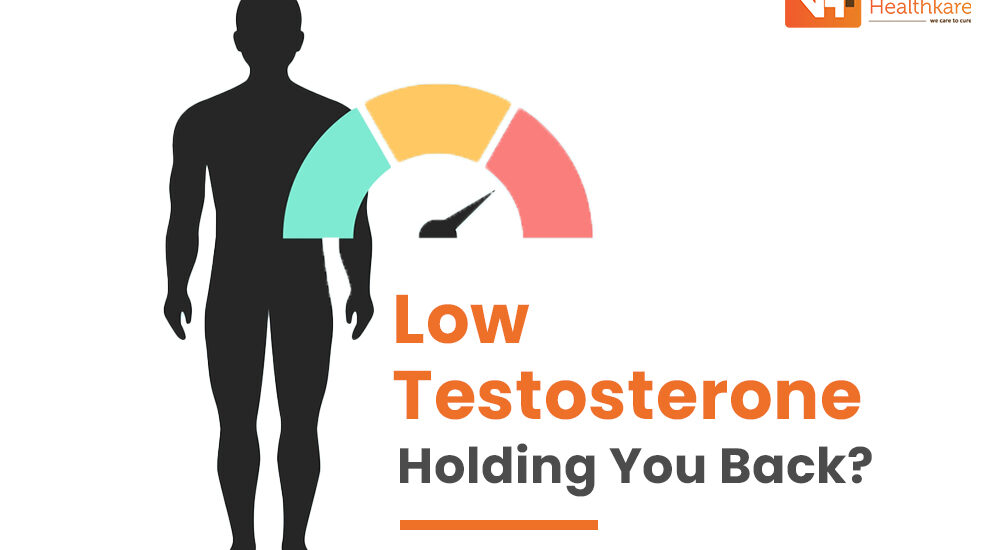Testosterone, the male sex hormone, plays a crucial role in the male body’s sexual development during puberty. It also helps maintain a person’s health throughout their life by controlling various bodily processes, including sperm generation, fat distribution, red blood cell production, muscle growth, bone density, mood stability, and libido.
However, testosterone levels naturally drop with age. Besides aging, other causes of decreased testosterone levels include obesity, sleep apnea, certain infections (like HIV), and some medications. Low testosterone, a condition where the testicles don’t produce enough testosterone, can significantly impact health. In this blog, we’ll explore the common signs that indicate low levels of this vital hormone.
Symptoms of Low Testosterone Levels
Erectile Dysfunction
Low testosterone levels can result in fewer erections occurring more frequently, erections not occurring at all during stimulation, and difficulties sustaining erections.
Hair Loss
Low testosterone levels are frequently the cause of hair loss. While age may contribute to hair loss, low testosterone levels can also be a factor. You may notice bald spots where you’ve never had them before, or that your hair is thinning more widely.
Reduced Bone Mass
A notable clinical manifestation of low testosterone in men is a marked reduction in Bone Mineral Density (BMD). Various research studies have shown that decreased BMD in men weakens bones and is linked to a higher incidence of bone fractures.
Low Semen Levels
Reduced testosterone levels translate into decreased semen production. Infertility can result from extremely low testosterone levels because insufficient semen production prevents sperm from swimming to the egg to fertilize it.
Sleep Disturbances
Men with low testosterone levels may have trouble falling or staying asleep. Low testosterone levels can lead to sleep apnea, a condition where a person experiences short-term breathing cessation, disrupting their sleep.
Decrease in Sex Drive
Testosterone plays a significant role in fueling sex drive and sexual performance. Low testosterone levels can result in reduced libido in some men. However, low sex drive can be affected by many physical, mental, and social factors, varying from person to person and day to day.
Increased Fatigue
Some studies suggest that low testosterone levels can lead to fatigue and exhaustion. Although the relationship between fatigue and testosterone is not entirely clear, people with low testosterone often complain of low energy levels.
Increased Body Fat
Several studies have validated the significant inverse correlation between testosterone and obesity. People with low testosterone levels may notice more body fat, especially around the abdomen, which raises the risk of heart disease. This deficiency may promote weight gain over time and the development of breast tissue in men.
Anemia
Testosterone helps your body make red blood cells. A decline in testosterone can cause a reduction in the number of red blood cells, a condition known as anemia. Recent findings suggest that testosterone gel given to male subjects with low testosterone and anemia improved blood counts compared to a placebo group.
Mood Swings
People with low testosterone may experience mood swings such as irritation, exhaustion, a persistently down mood, hopelessness, or a loss of enthusiasm in activities they used to enjoy. Research indicates that depression may be exacerbated by reduced testosterone levels.
Hot Flashes
Low testosterone levels may also be indicated by hot flashes. You might additionally encounter excessive perspiration, skin reddening, and night sweats.
Closing Thoughts
Testosterone deficiency may contribute to the development of various other health conditions, which may require treatment. Many people dismiss the symptoms associated with decreased testosterone as an unpleasant aspect of getting older. However, it’s crucial to address symptoms that lower your quality of life. If you’re experiencing bothersome symptoms of low testosterone, consult a healthcare professional.
By understanding the symptoms and causes of low testosterone, you can take proactive steps to maintain your health and well-being. Don’t ignore the signs; seek medical advice to ensure a healthy and balanced life.
If you suspect you have low testosterone levels, don’t wait. Consult with our healthcare professional


